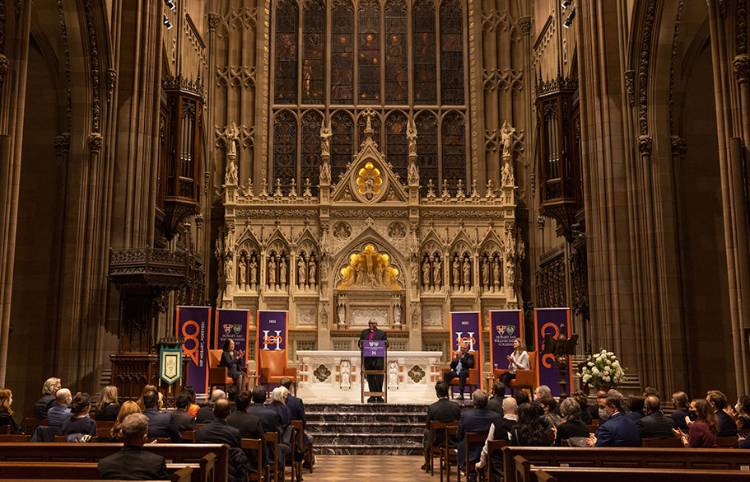The Pulteney StreetSurvey

E pluribus unum
The Bicentennial celebration kicked off this winter at Trinity Church in Manhattan, where Bishop Hobart once served as rector. After a singing of the alma mater by Trustee Garrett Mathieson ’74, the audience heard reflections on the Colleges’ history and future from President Jacobsen and Board Chair Craig R. Stine ’81, P’17, who recalled the story of Hobart’s founding and his own memories of arriving in Geneva. There, on the edge of Seneca Lake, Stine remembered finding “a community that would become the center of everything,” a place “to imagine the world as it could be, and to understand that the better world would be one that is built together.”
The evening culminated with an address from the Most Rev. Michael B. Curry ’75, D.D. ’20, the Presiding Bishop and Primate of the Episcopal Church. Curry, who is the honorary chair of the Bicentennial Committee, recalled the undergraduate history course in which he learned the origin of the Latin phrase etched on the Great Seal of the United States: e pluribus unum. With one of his old college textbooks perched on the podium, he ruminated on the national motto and its harmony with Dr. Martin Luther King Jr.’s vision of a “beloved community,” with its promise of healing, restoration, justice and equity.
“A motto is the aspiration,” Curry said. “It is the statement of who you long and pray and hope and labor to be. It is a claiming of your identity that can strengthen you for the present and clarify for the future. From many diverse peoples, one people, one nation, with liberty and justice, not for some but for all…. Cicero used the phrase [to describe]…how the Roman family or household unit is constituted. And he said this: ‘When each person loves the other as much as he loves himself, it makes one out of many possible.’ E pluribus unum. Love for others besides yourself makes e pluribus unum possible. Love for others besides just the self makes the United States of America possible. Love for others besides just the self will show us the way to take our jangling discords and create a beautiful symphony of love and compassion and justice and goodness and kindness.… And the day will break through, and the midnights of our greatest despairs will be the beginnings of the dawns of new days. I learned that at Hobart and William Smith Colleges.”
